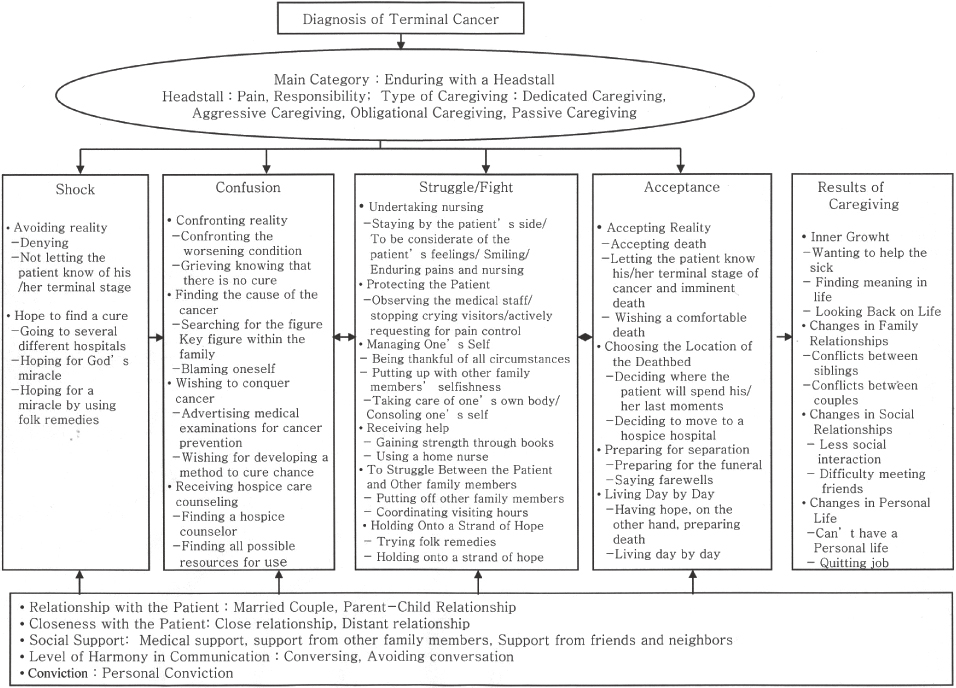Articles
- Page Path
- HOME > J Korean Acad Nurs > Volume 42(2); 2012 > Article
-
Original Article
- Experiences of Family Caregivers of Patients with Terminal Cancer
- Eun Sook Choi, Keum Soon Kim
-
Journal of Korean Academy of Nursing 2012;42(2):280-290.
DOI: https://doi.org/10.4040/jkan.2012.42.2.280
Published online: April 30, 2012
1Head Nurse, Center for Lung Cancer, National Cancer Center, Goyang, Korea.
2Professor, Seoul National University, College of Nursing, Research Institute of Nursing Science, Seoul, Korea.
- Address reprint requests to: Choi, Eun Sook. National Cancer Center, 323 Ilsan-ro, Ilsandong-gu, Goyang-si Gyeonggi-do, 410-769, Republic of Korea. Tel: (office) +82-31-920-0051, (cellular phone) 010-6688-4887, Fax: +82-31-920-0059, eunsookc77@ncc.re.kr
• Received: August 8, 2011 • Accepted: April 26, 2012
© 2012 Korean Society of Nursing Science
- 1,548 Views
- 10 Download
- 14 Crossref
Figure & Data
REFERENCES
Citations
Citations to this article as recorded by 

- Challenges and Proposed Improvements in Advance Care Planning: Insights from a Real Clinical Case of a Terminally Ill Patient in Korea
Hongyeul Lee
Korean Journal of Medical Ethics.2025; 28(1): 41. CrossRef - The End-of-Life Experiences of Cancer Patients’ Families in a Tertiary Hospital Providing Palliative Care Consultation During the COVID-19 Pandemic
Hyoung Suk Han, Mi Young Kim
Journal of Hospice and Palliative Care.2025; 28(2): 40. CrossRef - Do spouse burden of care, family resilience, and coping affect family function in gynecologic cancer in Korea?: a cross-sectional study
Minkyung Kim, Sukhee Ahn
Korean Journal of Women Health Nursing.2022; 28(3): 197. CrossRef - Caregiving experiences of Korean family caregivers of cancer patients: An integrative literature review
Eunice E. Lee, Shin‐Young Lee
Psycho-Oncology.2020; 29(10): 1486. CrossRef - Validation of the Nurses’ Involvement in Dying Patients and Family Care-Korean Version
Mi Yeon Kim, Hanna Lee, Inyoung Lee, Mirim Lee, Haeryun Cho
The Korean Journal of Hospice and Palliative Care.2020; 23(4): 228. CrossRef - A Concept Analysis of Posttraumatic Growth in Family Caregivers of Cancer Patients
Kyoung Hee Kim, Yong Soon Shin
Asian Oncology Nursing.2019; 19(1): 9. CrossRef - Experiences of Distress among Family Caregivers of Hospitalized Cancer Patients
Juhye Jin, Jin-Hee Yoo
Korean Journal of Adult Nursing.2017; 29(5): 451. CrossRef - Unmet Needs and Caregiver Burden Among Family Caregivers of Hospice Patients in South Korea
Jihyeon Lee, Chiyoung Cha
Journal of Hospice & Palliative Nursing.2017; 19(4): 323. CrossRef - The Lived Experience of Suffering of Family with Cancer Patients: Parse’s Human Becoming Research Method
Ye-Sook Choi
The Korean Journal of Hospice and Palliative Care.2016; 19(2): 127. CrossRef - Experiences of Spouses of Patients with Hematologic Malignancies: Finding a Way to Get Out of the Endless Tunnel
Youngshin Lee, Youngran Tak
Asian Oncology Nursing.2016; 16(1): 46. CrossRef - Family Caregivers’ Quality of Life, Depression and Anxiety according to Symptom Control in Hospice Patients
Yun Hee Kim, Seung Hun Lee, Ho Seop Lim, Young Jin Choi, Yun Jin Kim, Sang Yeoup Lee, Jeong Gyu Lee, Dong Wook Jeong, Kyoung Hwa Yu
The Korean Journal of Hospice and Palliative Care.2015; 18(4): 314. CrossRef - Impact Factors for Health of Family Caregivers of Hospice Patients
Bok Yae Chung, Hyeon Sook Park
The Korean Journal of Hospice and Palliative Care.2014; 17(2): 75. CrossRef - Effect of Supportive Education Program for Hospice Patients's Family
Tae Yeon Lee, Yunhee Kwon
The Journal of Korean Academic Society of Nursing Education.2014; 20(2): 175. CrossRef - Recognition of Patients, Families, Nurses, and Physicians about Clinical Decision-making and Biomedical Ethics
Ae Ran Park, Hyang Sook So, Myeong Cheong Chae
Asian Oncology Nursing.2014; 14(1): 23. CrossRef
Experiences of Family Caregivers of Patients with Terminal Cancer

Figure 1
Model of experiences of family caregivers with terminally ill patients with cancer.
Figure 1
Experiences of Family Caregivers of Patients with Terminal Cancer
 KSNS
KSNS
 E-SUBMISSION
E-SUBMISSION

 Cite
Cite

